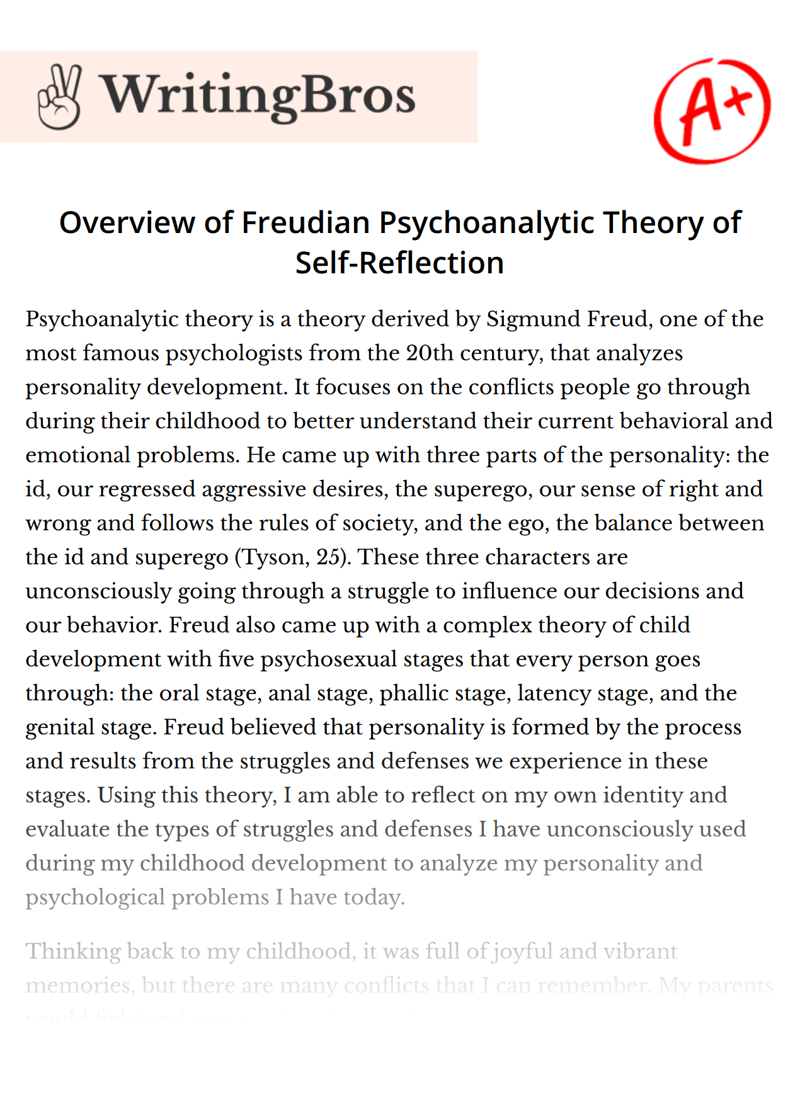Overview of Freudian Psychoanalytic Theory of Self-Reflection

Psychoanalytic theory is a theory derived by Sigmund Freud, one of the most famous psychologists from the 20th century, that analyzes personality development. It focuses on the conflicts people go through during their childhood to better understand their current behavioral and emotional problems. He came up with three parts of the personality: the id, our regressed aggressive desires, the superego, our sense of right and wrong and follows the rules of society, and the ego, the balance between the id and superego (Tyson, 25). These three characters are unconsciously going through a struggle to influence our decisions and our behavior. Freud also came up with a complex theory of child development with five psychosexual stages that every person goes through: the oral stage, anal stage, phallic stage, latency stage, and the genital stage. Freud believed that personality is formed by the process and results from the struggles and defenses we experience in these stages. Using this theory, I am able to reflect on my own identity and evaluate the types of struggles and defenses I have unconsciously used during my childhood development to analyze my personality and psychological problems I have today.
Thinking back to my childhood, it was full of joyful and vibrant memories, but there are many conflicts that I can remember. My parents would fight and argue quite often, and at some times the talk of divorce would come up. Playing sports was one of the ways I dealt with this conflict. I’ve been playing basketball since I was six years old, and playing was one of the ways I could release my stress and any aggressive emotion I had built up. This is one of Freud’s defensive structures, called sublimation. Sublimation is the act of satisfying an impulse with a substitute object, in a socially acceptable way, like playing sports. Rather than giving into my id and releasing my anger on my parents or displacing it on someone else, I relied more on my superego, which told me that treating other people poorly was unacceptable. Through sublimation, I was able to turn these id impulses into a healthy and productive way. I’ve also experience conflict with my brother throughout my childhood. He would repeatedly tease and ridicule me, and I would often feel defenseless against him. As a result, I developed one of Freud’s core issues: low self-esteem. Low self-esteem is the belief that “we are less worthy than other people and, therefore, don’t deserve attention, love, or any other of life’s rewards” (Tyson, 16). Growing up, I would always put others’ needs in front of mine, and at times felt like my opinion and voice didn’t matter. This resulted in being shy and less outgoing around others and would often feel like people would walk all over me. Today, I feel like I have overcome this struggle and put an effort into being more outgoing, however, I still see myself more as an introvert than an extrovert as a result of this childhood conflict.
Even though Freud’s psychoanalytic theory has been widely discredited and criticized, especially for his explicit focus on sex and sexism towards women, and the fact he didn’t use empircal research or studies to back up his theories like most psychologists, the psychoanalytic perspective remains as one of the top personality theories to date. According to Tyson, through psychoanalysis “we can begin to see the ways in which these concepts operate in our daily lives in profound rather than superficial ways, and we’ll begin to understand human behaviors that until now may have seemed utterly baffling.” Using psychoanalysis as a self-reflection for myself has revealed some of the defenses and conflicts that I was unaware I’ve used and gone through. I can now see the experiences and unconscious struggles that have made up my personality and the person I am today.
Cite this Essay
To export a reference to this article please select a referencing style below

